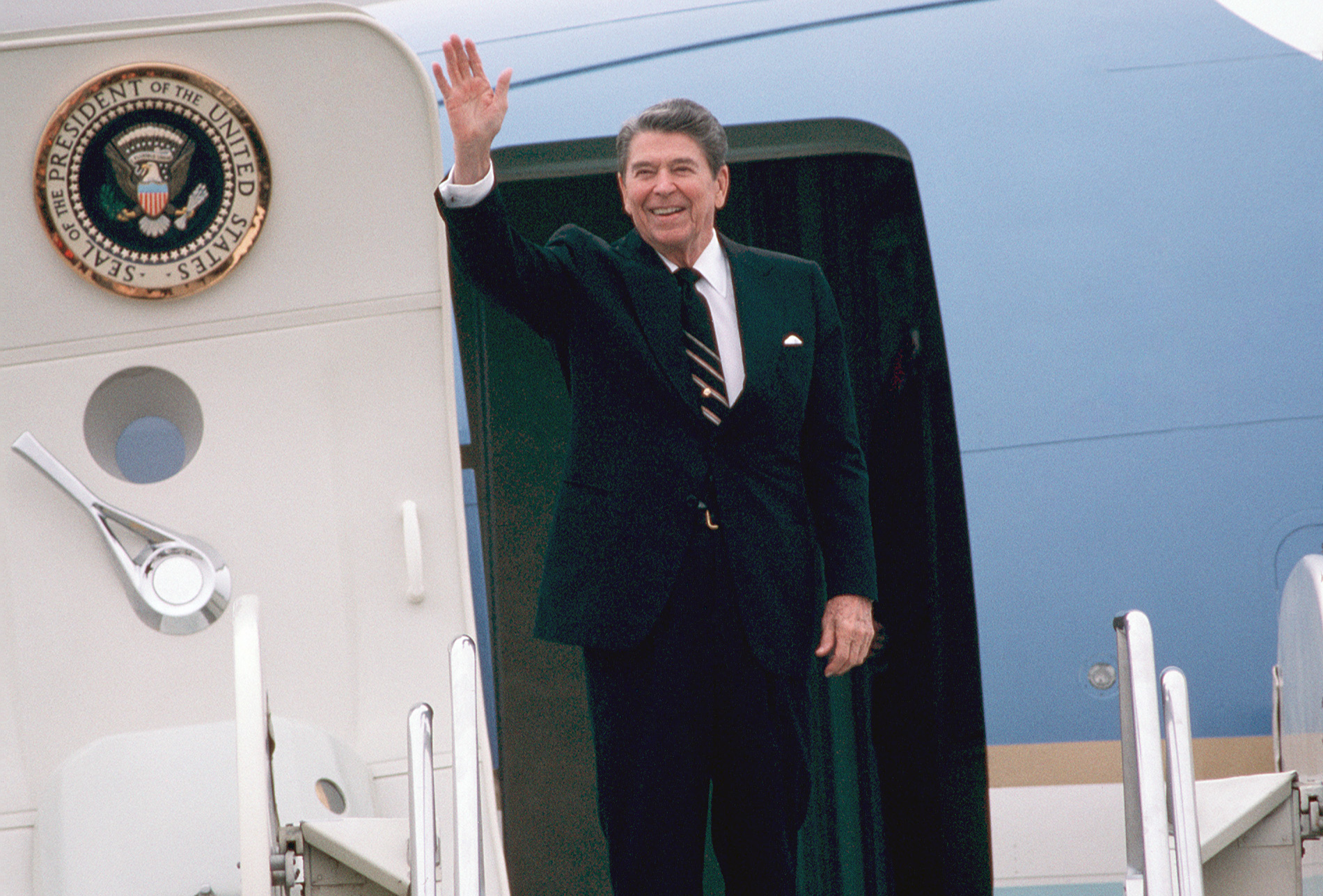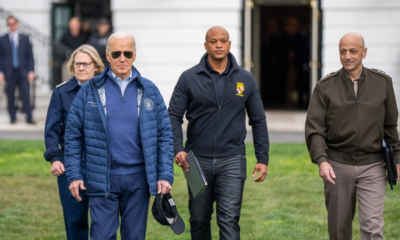Civilization
The Winning Team
On the 113th birthday of Ronald Reagan, a long-time Washington, D.C. reporter and editor remembers him and his era.

Ronald Reagan, who was born 113 years ago today, occupied the Oval Office when I arrived in Washington as a correspondent for the San Jose Mercury News. The president was also from California, and many of his key advisers, so even though the White House was not (yet) my beat, I often wrote about the personalities and policies of the administration.
At one point, I came across a juicy item that was little more than gossip, really, and wrote about it years later. It seems that Reagan, who portrayed Hall of Fame pitcher Grover Cleveland Alexander in a 1952 Warner Brothers film, was in the office of House Speaker Thomas P. “Tip” O’Neill Jr. prior to the State of the Union Address one year, when he complimented the speaker on the ornate desk in his office in the Capitol.
“Thank you, Mr. President,” O’Neill replied. “That desk belonged to Grover Cleveland.”
“Did you know?” Reagan responded. “I played him in a movie.”
For an awkward moment, nobody in the crowded room spoke. Finally, O’Neill said gently: “Uh, Mr. President, that’s Grover Cleveland Alexander.”
“Yeah,” Mr. Reagan answered, apparently not getting the distinction between the pitcher and the president. “Him.”
All these years later, I’m not sure I believe that story. It was told to me by a good source, a California congressman, who swore he was there, but in those days Democrats enjoyed portraying Reagan as an “amiable dunce,” to use Clark Clifford’s infamous phrase.
But Reagan has aged well, and turns out to have been better read and more intellectually curious than several of his successors. So maybe it happened that way, but as Donald Trump tries to emulate Grover Cleveland’s feat of getting elected in non-successive terms, it occurs to me that Reagan obviously knew who President Cleveland was and wouldn’t have mixed him up with his baseball playing namesake.
In any event, another baseball star was born on this date – George Herman Ruth, who was destined to become known around the world as “Babe” Ruth. He arrived in this world on Feb. 6, 1895. He did not have an easy childhood.
The Babe spent the first seven years of life living with his family in rooms above his father’s saloon at 426 W. Camden Street in Baltimore. In 1902, the boy was placed in St. Mary’s Industrial School in Baltimore, which is often described as an orphanage, but which Ruth himself defined as “a training school for orphans, incorrigibles, delinquents, boys whose homes had been broken by divorce, runaways picked up on the streets of Baltimore and children of poor parents who had no other means of providing an education for them.”
So why was young George Ruth sent to St. Mary’s reform school?
“I was listed as an incorrigible, and I guess I was,” his autobiography concedes. “I chewed tobacco when I was 7, not that I enjoyed it especially, but, from my observation around the saloon it seemed the normal thing to do.”
He was in and out of that institution until Feb. 27, 1914. The priests and other instructors were teaching him how to be a tailor, but outside the classroom he was in training for another pastime, one denoted in a simple line on his school record: “He is going to join the Balt. baseball team.”
The young man’s subsequent exploits on the baseball diamonds of Baltimore, New York, and elsewhere are woven into the fabric of 20th century American history.
So, too, are the exploits of Ronald Wilson Reagan, born in Tampico, Ill., on Feb. 6, 1911. This boy also had a problematic father. Jack Reagan had “the Irish disease,” as his younger son would later put it. Although we wouldn’t phrase it that way today out of heightened sensibilities about ethnic stereotypes, “disease” is the right word. Jack Reagan was an alcoholic.
Ronald Reagan rose to fame in the Midwest as “Dutch” Reagan, the voice of the Chicago Cubs beloved by Iowans who tuned into WHO radio in Des Moines, where Reagan re-created Cubs games off the teletype. It was during a spring training trip to Catalina Island, where the Cubbies assembled each February, that Reagan got the idea to go to Hollywood for his fateful 1937 screen test.
Fifteen years later, he was cast alongside Doris Day in “The Winning Team,” the schmaltzy movie about Hall of Fame pitcher Grover Cleveland Alexander and his wife – and the pitcher’s battle with the bottle. As baseball writer Joe Posnanski noted, Hollywood whiffed with this baseball movie. (“It shouldn’t be this bad,” he wrote. “[It] stars Ronald Reagan as pitcher Grover Cleveland Alexander. This is such a wonderful confluence of American history; it makes Alexander the only player in sports history to be named for one president and to have another president play him in a movie.”)
Yet, it does have a couple of good moments. Although it took liberties with the sequence, the movie depicts the Cardinals’ 39-year-old Alexander striking out Babe Ruth. Reagan is playing “Alex” and the Ruth strikeout is drawn from archival footage, so in a sense Ronald Reagan is striking out Babe Ruth, something he never would have been able to do in real life. But there is this: Reagan’s body double during that film was Bob Lemon, another Hall of Fame pitcher. Here’s a story Lemon told a Sports Illustrated reporter about the 1952 filming of “The Winning Team.”
“The idea was that Alexander was making this comeback. So he nailed a catcher’s mitt on the side of his barn. The director calls me over and says, ‘Now, I want you to hit that mitt right in the middle.’ ‘Piece of cake,’ says I. Under ordinary circumstances I hit that mitt nine times out of 10. Well, maybe it was the cameras or something, but I got nowhere near it. I was hitting everything on that barn but the damn mitt, and the madder I got, the worse I got.
“Then I hear this voice say, ‘Mind if I try it?’ It’s Reagan. Now, I won’t say he threw exactly like a girl, but I doubted he could hit the broad side of that barn. But I said, ‘O.K., you try.’ I guess I don’t have to say more: One pitch, smack in the middle of that mitt. I’ve never been so embarrassed in all my life.”
Bob Lemon never had anything to be embarrassed about when it came to baseball. The year that movie was made, he won 22 games for the Cleveland Indians while leading the league in complete games and innings pitched. And he would hardly be the last person to underestimate Ronald Reagan.
Tip O’Neill certainly did, at least initially. When Reagan arrived in Washington, O’Neill haughtily informed the new president that he was now in the “big leagues.” The new president’s aides chafed at such high-handedness, but Reagan didn’t get mad. He got even – by promptly rousting the Democrats on taxes and budget policy in vote after vote that spring. The game was so one-sided for a while that when O’Neill was at home in Boston in May 1981, a constituent asked him what was going on in Washington. “I’m getting the shit whaled out of me,” O’Neill responded tersely.
Politics wasn’t as personal back then. Or, rather, policy differences weren’t considered barriers to working together – or to having personal relationships. O’Neill and Reagan were stubborn Irish American pols with distinctly different views on the role government should play. Yet they forged a human connection that transcended politics. When Reagan was shot and wounded on March 30, 1981, O’Neill was one of the first people allowed to see him.
“God bless you, Mr. President,” O’Neill said while holding Reagan’s hand in his own. Reagan smiled wanly from his hospital bed and replied, “Thanks for coming, Tip.” The speaker then got down on his knees and recited the 23rd Psalm and kissed Reagan on the forehead.
In 1986, when O’Neill retired, Reagan spoke at the ceremony. “Mr. Speaker,” the president said, “I’m grateful you have permitted me in the past, and I hope in the future, that singular honor of calling you my friend.”
This article was originally published by RealClearPolitics and made available via RealClearWire.
Carl M. Cannon is the Washington Bureau Chief of RealClearPolitics and Executive Editor of RealClear Media Group. Carl is a past recipient of the Gerald R. Ford Journalism Prize for Distinguished Reporting and the Aldo Beckman Award, the two most prestigious awards for White House coverage. Previous positions include executive editor of PoliticsDaily.com, D.C. bureau chief for Reader's Digest and White House correspondent for both the Baltimore Sun and National Journal. He was a 2007 fellow-in-residence at Harvard University's Institute of Politics, a past president of the White House Correspondents’ Association, and is a published author.
-

 Guest Columns4 days ago
Guest Columns4 days agoData Centers Are a Repeat of History in PA’s Coal Region
-

 Executive4 days ago
Executive4 days agoWaste of the Day: Throwback Thursday – Americans Lead Moroccan Pottery Classes
-

 Executive3 days ago
Executive3 days agoWaste of the Day: Secret Settlements get Taxpayer Money
-

 Civilization4 days ago
Civilization4 days agoThe Northwest Passage Will Be Decided by Capability, Not Law
-

 Civilization5 days ago
Civilization5 days agoViolence Is Politics by Other Means
-

 Accountability8 hours ago
Accountability8 hours agoWaste of the Day: Principal Bought Lobster with School Funds
-

 Civilization5 days ago
Civilization5 days agoOn ICE, No Moore Reasoning
-

 Civilization2 days ago
Civilization2 days agoThe devil is in the details












